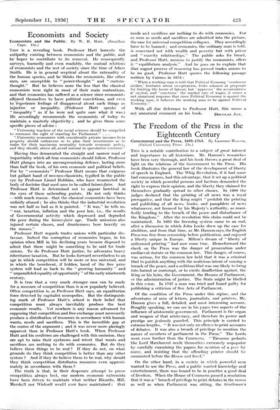Economists and Society
Tins is a revealing book. Professor Hutt laments- the antipathy existing between economists and the public, and he hopes to contribute to its removal. He consequently surveys, learnedly and even readably, the mutual relations Of economists and the rest of society since the time of Adam Smith. He is in general sceptical about the rationality of the human species, and he thinks the economists, like other men, are susceptible to " power-thought " and " custom- thought." But he believes none the less that the classical economists were right in most of their main contentions, and that economics has suffered as a science since economist.; allowed themselves to have political convictions, and eve n . = • to experieriCe feelings of disapproval about such things as
injustice or inequality. (Professor Hutt speaks of " inequality " as if he were not quite sure what it was.) He accordingly recommends the economists of ' today to maintain. a masterly objectivity ; and he gives them some specific pieces of advice : " University teachers of the social sciences should be compelled to renounce the right of standing for Parliament." . . .
".,University.economists with considerable private incomes frcm property_ should endeavour so to plan their investments as to make for their maximum neutrality towards economic policy, and they should, above all, avoid interest in speculative ventures."
Having thus demarcated the straight and narrow road of impartiality which all true economists should follow, Professcir
Hutt plunges into an uncompromising defence, lasting more than half the book, of his own economic and political beliefs. For by " economists ". Professor Hutt means that exiguous
but gallant band of neo-neo-classicists, typified in the public eye by Professor Lionel Robbins, who have resurrected the body of dOctrine that used once to be called laissez-faire. And Professor Hutt is determined not to appear heretical in the eyes of these unbending purists. He not only thinks —with much reason—that the classical economists have been unfairly abused ; he also thinks that the industrial revolution was not half so bad as it is painted. " It was," he tells us, " war, taxation, inflation and the poor law, i.e., the results of Governmental activity which depressed and degraded
the pcior during the laissez-faire age. Trade unionism also injured certain- classes, and drunkenness bore heavily on
the masses."
Professor Hutt regards trades unions with particular dis- favour. Indeed the corruption of economics began, in his opinion when Mill in his declining years became disposed to admit that there might be something to be said for trade anions. To do Professor Hutt justice, he advocates heavy inheritance taxation. But he looks forward nevertheless to an age in which competition will be more or less universal, and in which the beneficent, if hidden; hand of the free price system will lead us back to the " growing humanity " and " unparalleled equality of opportunity " of the early nineteenth century.
It is . true that a very much stronger case can be made for a measure of competition than is n3w popularly believed. Often competition is, as Professor Hutt says, an equalitarian force detested by capitalist monopolies. But the distinguish- ing . mark of Professor Hutt's school is their belief that competition must always inevitably produce the best economic results.: Yet nowhere is any reason advanced for supposing that competition and free exchange must necessarily
produce a distribution of 'resources in accordance with human wants, needs and sacrifices. This is the incredible gap at the centre of the argument ; and it was never more glaringly apparent than in Professor Hutt's book. When Professor
Hutt and his confreres are challenged with this omission, they are -apt to raise their eyebrows and retort that wants and sacrifices are nothing to do with economics. But do they believe these things to be real ? If they do not, on what grounds do they think competition is better than any other system '1 And if they do believe them to be real, why should they think competition distributes resources even approxi- mately in accordance with them, ?
The truth is that, in their desperate. attempt to .prove competition always best, our modem economic extremists have been driven to maintain what neither Ricardo, Mill, Marshall nor Wicksell woull ever have maintained : that needs 'and sacrifices are nothing to do with economics. For as soon as needs and sacrifices are admitted into the picture, the ease for universal competition collapses. They accordingly have to be banned ; and economics, the ordinary man is told, is concerned not with wealth and poverty but with prices and " scarcity relationships." The public asks for bread, and Professor Hutt, anxious to justify the economists, offers it " equilibrium analysis." And he goes on to explain that that august process of reasoning has proved trades unions to be no good. Professor Hutt quotes the following passage written by Cairnes in 1873 :
" When a working man is told that Political Economy ' condemns strikes,' hesitates about co-operation, looks askance at proposals for limiting the hours of labour, but ' approves' the accumulation o' capital, and ' sanctions ' the market rate of wages, it seems a not unnatural response that since Political Economy is against the working man, it behoves the working man to be against Political Economy."
With all due deference to Professor Hutt, this seems a
not unnatural comment on his book. DOUGLAS JAY. .












































 Previous page
Previous page